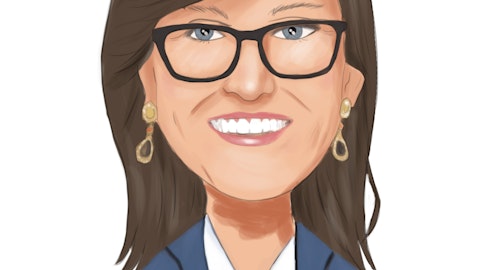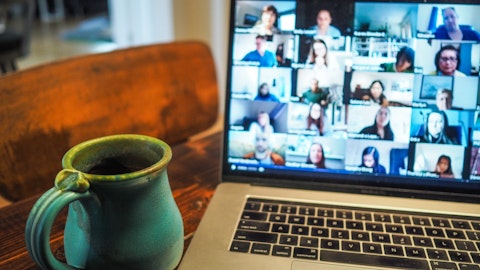Kelly Steckelberg: Yeah. So we certainly — we have talked about this the last couple of quarters, have seen more and more of our deals shifting to the end of the quarter and taking on that more historically natural cycle that we didn’t — we haven’t seen since really early in the pandemic, but that is absolutely the case for us and we have adjusted our forecast for Q4 for some of that linearity as well. We have continued to see, as I keep saying, strength in our renewals, and I think, that’s because while there’s concern about layoffs, there’s this other phenomenon about flexible work, right? Everybody wants to continue to working in the way they become accustomed to. And as long as employers are supporting that and their employees it really means everybody needs a Zoom license.
If you are out of the office, even 1 day a week, you need that Zoom license for phone, for Meetings, for what Zoom One. And so I think that is really compelling reasons for organizations to continue to renew with them.
Sterling Auty: Understood. Thank you.
Eric Yuan: Yeah. Thank you, Sterling. If I could
Operator: And moving — oh, apologies, Eric. You may proceed now.
Eric Yuan: Even for those businesses, right, after before the full UC stack, look at the team chat is getting more and more popular. And also the founder also can use that for their personal use cases as well, right, because that’s free. That’s why a lot of tractions for other parts of our entire UC platform.
Operator: Our next question will come from Michael Funk with Bank of America. Michael, video for us. All right, Michael, if you can hear us, please go ahead start your video and come off mute to ask your question. I am hearing
Eric Yuan: Yeah. Michael.
Operator: Hearing no response, we will go ahead and move on to William Power with Baird. And William, if you wouldn’t mind doing the same thing. Great. Thank you so much.
William Power: Great. Thanks for taking the question. Probably for Kelly, a pretty notable increase in stock-based compensation expense. I know you talked about this at the Investor Day to that you expected given top-ups to be more elevated. But it would be great to just get a little more perspective as to how you are thinking about that going forward, is this closer to a peak level, should — it will stay at this level? Maybe over a longer term time frame, how investors should expect that to trend? And I guess kind of tied to that, you have been aggressive on the stock buyback front, what are the plans there going forward and how could that tie in and how you think about stock-based compensation?
Kelly Steckelberg: So, first, we believe that the Supplemental Grant program is really important for the strategy of the company in terms of retaining our employees and keeping them focused and not having to worry about that. And the Supplemental Grants vest over the same period as the underlying grant that they are tied to. So you are going to see this level continue for a few years as those grants are vesting through and many of them originally were four-year grants, so they have two years or three years left in which you are going to see that stock-based comp as those underlying shares are vesting. With the stock, once the stock stabilizes then you will see less impact from that or less need for additional grants. So we are hoping that we are at that place and that you are going to not see additional Supplemental Grant in that same level.
But until we get past probably another year’s worth, we might have some more. In terms of the repurchase, as you heard, we purchased $991 million, so or 11 million shares. So we have a little bit of room with that and once we have completed that, we will evaluate whether or not we want to ask the Board for authorization. We haven’t done that yet.




